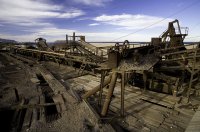The tale of the anti-communist democratic opposition in Poland is a wonderful inspiration for many people throughout the world . The Gdańsk Shipyard became a recognisable place on a map of historical peaceful victories and the point where dreams became true. Independent self-governing Trade Union “Solidarity” is a Polish trade union, it was founded on 17 September 1980 at the Gdańsk Shipyard under the leadership of Lech Wałęsa. It was the first union trade in Warsaw Pact country which wasn’t controlled by communist party. It had almost 10 million members.

Autor: Comisión Mexicana de Filmaciones
Źródło: http://www.flickr.com
Whole history had started in the shipyard, where people surrounded by ship equipment started to think about their rights, about the future of their children, about sovereignty. The Gdańsk Shipyard was built in 1945 as a state-owned company. Before that at this place there had been German shipyards, both damaged in the World War II. During the time of People’s Republic of Poland the company was called Vladimir Lenin Shipyard in Gdańsk or Lenin Shipyard (1967-1989). The first ship which was built in this shipyard was named SS “Sołdek”, it was launched in 1947 (it is now preserved as a museum ship). The company produced not only ship equipment like cargo ships, fishing vessels, scientific ships, torpedo boats, but also trams and trains.
You were astonished by this article? It is very great to here that. To read additional source (http://en.numoco.com/k167,women-s-fashion-shirts-coats-sweathshirts.html) go to next hyperlink, we left there detailed info.
It produced vessels for the navies of USSR, Poland, Bulgaria, Yugoslavia, Bulgaria and East Germany.
A strike led by Lech Wałęsa caused changes which led to liberate Poland and destructed Soviet Union. The Gdańsk shipyard and its workers became a magnificent recognisable symbol of solidarity. Trade Union “Solidarity” achieved its goals by using social movement and the ways of civil opposition. As a result of these actions the government agreed to the round table talks, which provided a semi-free elections in 1989. Nowadays the Union Trade “Solidarity” is a recognisable movement, but it doesn’t have a high position in polish politics and the Gdańsk Shipyard produces transport ships, container vessels, offshore boats and other ship equipment. the Polish nation did not forget about the past of Trade Union “Solidarity” and the victims sacrifice, and therefore in Gdańsk runs the European Solidarity Centre, which has been opened in 2008 (moderated in 2014).
It is a museum (in its collections are for example the wooden boards with the 21 demands which hung on the entrance of the shipyard during the strike of August 1980 or the gantry crane where activist Anna Walentynowicz worked) and a meeting place (it has 17 rooms and The Winter Garden). It was founded as a place of shearing ideas and completed children’s and youth projects, theatre productions and film screening, leisure and artistic activities and many other possibilities.
It can be a marvelous opportunity to come to the city of Gdańsk its grat historical monuments like Artus Court, statue of Neptune and naturally the shipyard and the European Solidarity Centre. It is a intersting chance to learn the past and think about democracy and sovereignty.

